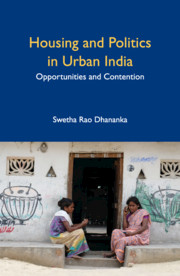Book contents
- Frontmatter
- Dedication
- Contents
- List of Figures
- List of Tables and Box
- Acknowledgements
- List of Abbreviations
- 1 Claiming Adequate Housing in Urban India: An Introduction
- 2 Indian Democracy: Normative Prescriptions and Everyday Practices
- 3 Governmentality of Housing and the Politics of Access
- 4 Mobilization on Behalf of the Urban Poor
- 5 Mobilizations by the Urban Poor
- 6 Claiming Housing despite Indian Politics and Governance
- Epilogue
- Bibliography
- Index
2 - Indian Democracy: Normative Prescriptions and Everyday Practices
Published online by Cambridge University Press: 30 April 2020
- Frontmatter
- Dedication
- Contents
- List of Figures
- List of Tables and Box
- Acknowledgements
- List of Abbreviations
- 1 Claiming Adequate Housing in Urban India: An Introduction
- 2 Indian Democracy: Normative Prescriptions and Everyday Practices
- 3 Governmentality of Housing and the Politics of Access
- 4 Mobilization on Behalf of the Urban Poor
- 5 Mobilizations by the Urban Poor
- 6 Claiming Housing despite Indian Politics and Governance
- Epilogue
- Bibliography
- Index
Summary
I was back at my desk in the beginning of 2011 trying to decrypt my notes from fieldwork, but little did I know that events relevant to my research interests would culminate in the 2011 Indian anti-corruption movement. The series of demonstrations and protests intended to establish a strong legislation and enforcement against perceived political corruption and introduce the Citizen's Ombudsman Bill with the purpose of appointing an independent body to investigate and enforce corruption cases. In the run up to the events in 2011 were a number of scams relating to land and housing. Scams also from Karnataka were feeding the movement against corruption: illegal mining, state-owned prime land allotted to family members of the chief minister, and scams over dwelling units constructed by the Karnataka Housing Board. This movement had a lot to say about the nature of the state resisting the anti-corruption bill suggested by civil society, the action repertoire from which the tactics were drawn, the particular segment of society it drew participants from, and the entrenched practices of corruption in the domain of land and housing. A list enumerating the largest scams in 2010 in India featured 12 scams, 7 of them directly affecting the poor in some way, while 5 of them were directly related to housing.
The goal of this chapter is to pronounce a judgement on the political opportunities in India that considers the formal polity and informal modes of exchange circuits that includes corruption. I will attempt to carry out this judgement based on the nested nature of the federal state and by incorporating informal dimensions. To my knowledge such a comprehensive exercise on the Indian state has not yet been published and might be useful to a wider public interested in Indian social movements and politics. The question at the core is: Are the formal opportunities interacting with the informal ones facilitating or inhibiting mobilizations? To pronounce a judgement about the Indian state and its operation is not an easy task. Tilly, in his book Regimes and Repertoires (2006), argues that on balance India ought to be judged as a ‘high capacity/democratic’ regime.
- Type
- Chapter
- Information
- Housing and Politics in Urban IndiaOpportunities and Contention, pp. 28 - 68Publisher: Cambridge University PressPrint publication year: 2020



